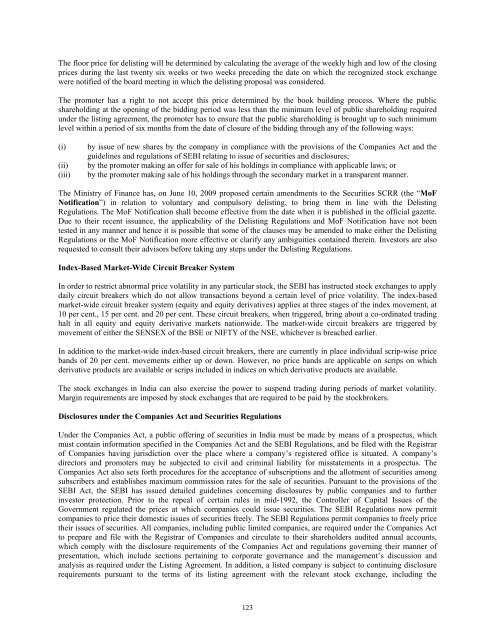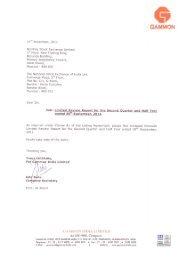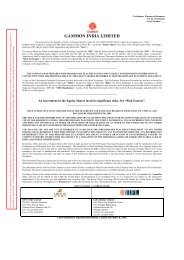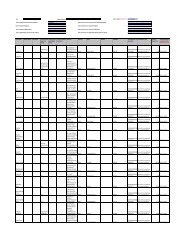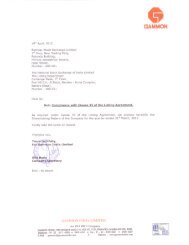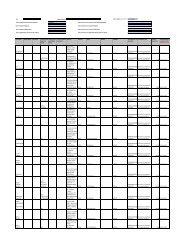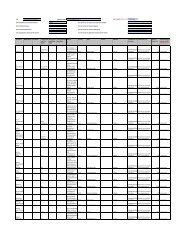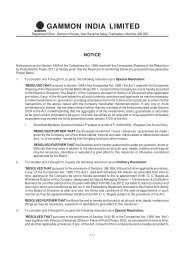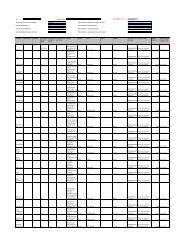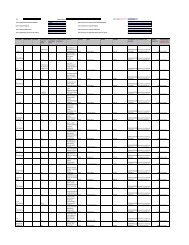GAMMON INDIA LIMITED
GAMMON INDIA LIMITED
GAMMON INDIA LIMITED
You also want an ePaper? Increase the reach of your titles
YUMPU automatically turns print PDFs into web optimized ePapers that Google loves.
The floor price for delisting will be determined by calculating the average of the weekly high and low of the closing<br />
prices during the last twenty six weeks or two weeks preceding the date on which the recognized stock exchange<br />
were notified of the board meeting in which the delisting proposal was considered.<br />
The promoter has a right to not accept this price determined by the book building process. Where the public<br />
shareholding at the opening of the bidding period was less than the minimum level of public shareholding required<br />
under the listing agreement, the promoter has to ensure that the public shareholding is brought up to such minimum<br />
level within a period of six months from the date of closure of the bidding through any of the following ways:<br />
(i) by issue of new shares by the company in compliance with the provisions of the Companies Act and the<br />
guidelines and regulations of SEBI relating to issue of securities and disclosures;<br />
(ii) by the promoter making an offer for sale of his holdings in compliance with applicable laws; or<br />
(iii) by the promoter making sale of his holdings through the secondary market in a transparent manner.<br />
The Ministry of Finance has, on June 10, 2009 proposed certain amendments to the Securities SCRR (the “MoF<br />
Notification”) in relation to voluntary and compulsory delisting, to bring them in line with the Delisting<br />
Regulations. The MoF Notification shall become effective from the date when it is published in the official gazette.<br />
Due to their recent issuance, the applicability of the Delisting Regulations and MoF Notification have not been<br />
tested in any manner and hence it is possible that some of the clauses may be amended to make either the Delisting<br />
Regulations or the MoF Notification more effective or clarify any ambiguities contained therein. Investors are also<br />
requested to consult their advisors before taking any steps under the Delisting Regulations.<br />
Index-Based Market-Wide Circuit Breaker System<br />
In order to restrict abnormal price volatility in any particular stock, the SEBI has instructed stock exchanges to apply<br />
daily circuit breakers which do not allow transactions beyond a certain level of price volatility. The index-based<br />
market-wide circuit breaker system (equity and equity derivatives) applies at three stages of the index movement, at<br />
10 per cent., 15 per cent. and 20 per cent. These circuit breakers, when triggered, bring about a co-ordinated trading<br />
halt in all equity and equity derivative markets nationwide. The market-wide circuit breakers are triggered by<br />
movement of either the SENSEX of the BSE or NIFTY of the NSE, whichever is breached earlier.<br />
In addition to the market-wide index-based circuit breakers, there are currently in place individual scrip-wise price<br />
bands of 20 per cent. movements either up or down. However, no price bands are applicable on scrips on which<br />
derivative products are available or scrips included in indices on which derivative products are available.<br />
The stock exchanges in India can also exercise the power to suspend trading during periods of market volatility.<br />
Margin requirements are imposed by stock exchanges that are required to be paid by the stockbrokers.<br />
Disclosures under the Companies Act and Securities Regulations<br />
Under the Companies Act, a public offering of securities in India must be made by means of a prospectus, which<br />
must contain information specified in the Companies Act and the SEBI Regulations, and be filed with the Registrar<br />
of Companies having jurisdiction over the place where a company’s registered office is situated. A company’s<br />
directors and promoters may be subjected to civil and criminal liability for misstatements in a prospectus. The<br />
Companies Act also sets forth procedures for the acceptance of subscriptions and the allotment of securities among<br />
subscribers and establishes maximum commission rates for the sale of securities. Pursuant to the provisions of the<br />
SEBI Act, the SEBI has issued detailed guidelines concerning disclosures by public companies and to further<br />
investor protection. Prior to the repeal of certain rules in mid-1992, the Controller of Capital Issues of the<br />
Government regulated the prices at which companies could issue securities. The SEBI Regulations now permit<br />
companies to price their domestic issues of securities freely. The SEBI Regulations permit companies to freely price<br />
their issues of securities. All companies, including public limited companies, are required under the Companies Act<br />
to prepare and file with the Registrar of Companies and circulate to their shareholders audited annual accounts,<br />
which comply with the disclosure requirements of the Companies Act and regulations governing their manner of<br />
presentation, which include sections pertaining to corporate governance and the management’s discussion and<br />
analysis as required under the Listing Agreement. In addition, a listed company is subject to continuing disclosure<br />
requirements pursuant to the terms of its listing agreement with the relevant stock exchange, including the<br />
123


